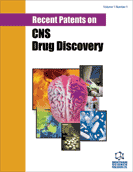-
s Antisense Oligonucleotides in the Treatment of Cerebral Gliomas. Review of Concerning Patents
- Source: Recent Patents on CNS Drug Discovery (Discontinued), Volume 9, Issue 1, Apr 2014, p. 2 - 12
-
- 01 Apr 2014
Abstract
Gliomas are the most common and malignant primary brain tumors in the adult population. Despite the intensive research on cancer pathology, real mechanisms concerning glioma progression are not completely understood. The prognosis in patients affected by malignant gliomas is still very unfavorable. Recent genomic analyses have revealed patterns of molecular changes within tumor subclasses that harbor distinct underlying biology, clinical prognosis, and pathogenic routes. So, novel treatments will have to be able to interfere at different molecular levels in gliomagenesis minimizing the toxicity. In particular, antisense oligonucleotides are able to inhibit expression of specific genes by interfering with transcription or, more usually, with translation. In this review, we will focus on mechanisms of antisense oligonucleotides reporting clinical and experimental studies. We will also report a large number of patents which adopt the antisense oligonucleotides as potential therapeutic approach in gliomas treatment.


